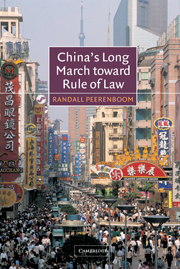Book contents
- Frontmatter
- Contents
- Preface
- List of abbreviations
- 1 Introduction
- 2 The evolution of rule of law in China: the role of law in historical context
- 3 Post-Mao reforms: competing conceptions of rule of law
- 4 Rule of law and its critics
- 5 Retreat of the Party and the state
- 6 The legislative system: battling chaos
- 7 The judiciary: in search of independence, authority, and competence
- 8 The legal profession: the quest for independence and professionalism
- 9 The administrative law regime: reining in an unruly bureaucracy
- 10 Rule of law and economic development
- 11 Rule of law, democracy, and human rights
- 12 Conclusion: the future of legal reform
- References
- Index
7 - The judiciary: in search of independence, authority, and competence
Published online by Cambridge University Press: 20 July 2009
- Frontmatter
- Contents
- Preface
- List of abbreviations
- 1 Introduction
- 2 The evolution of rule of law in China: the role of law in historical context
- 3 Post-Mao reforms: competing conceptions of rule of law
- 4 Rule of law and its critics
- 5 Retreat of the Party and the state
- 6 The legislative system: battling chaos
- 7 The judiciary: in search of independence, authority, and competence
- 8 The legal profession: the quest for independence and professionalism
- 9 The administrative law regime: reining in an unruly bureaucracy
- 10 Rule of law and economic development
- 11 Rule of law, democracy, and human rights
- 12 Conclusion: the future of legal reform
- References
- Index
Summary
Rule of law requires a judiciary that is independent, competent, and enjoys sufficient powers to resolve disputes fairly and impartially. China's judiciary falls short on each of these three dimensions.
As a matter of law, the PRC Constitution provides that the courts shall “in accordance with law, exercise judicial power independently and are not subject to interference by administrative organs, public organizations or individuals.” The Judges Law sought to strengthen the independence of the judiciary by providing that judges have the right to be free from external interference in their work. In addition, judges were given the right to raise a complaint if a state organ or official committed an act infringing on their rights, and administrative entities, public organizations, and individuals may be held liable for interfering in particular cases.
Under the PRC's unitary system, however, the courts are administratively and institutionally accountable to the corresponding level of people's congresses that created them, as stated in Article 128 of the Constitution. In addition, courts are subject to the dual leadership system, like any other entity. Thus, courts are subject to the Party Committee and other Party organizations at the same level, as well as to supervision by higher-level courts. The procuracy also exercises supervision over the judiciary, leading to the curious situation where procuratorates are subject to the authority of the court when they appear before the court as a prosecutor and yet they have the authority to challenge the “final” decisions of the court.
- Type
- Chapter
- Information
- China's Long March toward Rule of Law , pp. 280 - 342Publisher: Cambridge University PressPrint publication year: 2002
- 1
- Cited by



